- Home
- Neal Stephenson
Zodiac Page 3
Zodiac Read online
Page 3
“Sangamon Taylor?”
“You got a warrant somewhere? Hey! You aren’t a real cop at all, are you?”
“We got some witnesses. A bunch of us security guards been over there on the main building, watching you here. Now, we know this van.
“I know, we’re old pals.”
“Right. So we recognized it when it stopped here last night. And we watched you stripping it. And maybe fucking with the VIN?”
“Look. If you want to hassle me, just go to your boss and say, ‘pH?’. Just tell him that.”
“P-H? Isn’t that something they put in shampoo?”
“Close enough. Tell him ‘pH thirteen’. And for your sake, get a different job. Don’t go out there, into those flats, patrolling around. You understand? It’s dangerous.”
“Oh, yeah,” he said, highly amused. “Big criminal element down there.”
“Exactly. The board of directors of Basco. The Pleshy family. Don’t let them kill again.”
Back at the Omni, Gomez said, “What’d you tell him?”
“pH. Went here last week and tested their pH and it was thirteen.”
“So?”
“So they’re licensed for eight. That means they’re putting shit into the river that’s more than two times the legal limit.”
“Shit, man,” Gomez said, scandalized. That was another good thing about Gomez. He never got jaded.
And I hadn’t even told him the truth. Actually, the shit coming out of Basco’s pipe was a hundred thousand times more concentrated than was legally allowed. The difference between pH 13 and pH 8 was five, which meant that pH 13 was ten to the fifth power—a hundred thousand times—more alkaline than pH 8. That kind of thing goes on all the time. But no matter how many diplomas are tacked to your wall, give people a figure like that and they’ll pass you off as a flake. You can’t get most people to believe how wildly the eco-laws get broken. But if I say “More than twice the legal limit,” they get comfortably outraged.
3
I had Gomez drop me off in Harvard Square so I could eat birdseed and tofu with a reporter from The Weekly. Ditched my cigar. Then I went in to this blond-wood extravaganza, just off the square, allowed the manager to show me her nostrils, and finally picked out Rebecca sitting back in the corner.
“How’s the Granola James Bond?”
I nearly unleashed my Toxic Spiderman rap but then remembered that some people actually admired me, Rebecca among them, and it was through admiration and James Bond legends that we got things like free cars and anonymous toxic tips. So I let it drop. Rebecca had picked the sunniest corner of the room and the light was making her green eyes glow like traffic lights and her perfume volatilize off the skin. She and I had been in the sack a few times. The fact that we weren’t going to be there in the near future made her a hundred thousand time—oops—more than twice as beautiful. To distract myself, I growled something about beer to a waiter and sat down.
“We have—” the waiter said, and drew a tremendously deep breath.
“Genesee Cream Ale.”
“Don’t have that, sir.”
“Beck’s.” Because I figured Rebecca was paying.
“The specialty is sparkling water with a twist,” Rebecca said.
“I need something to wash the Everett out of my mouth.”
“Been out on your Zode?”
“Zodiac to you,” I said. “And no, I haven’t.”
We always began our conversations with this smart-assed crap. Rebecca was a political reporter and spent her life talking to mush-mouths and blarney slingers. Talking to someone who would say “fuck” into a tape recorder was like benzedrine to her. There was also an underlying theme of flirtation—“Hey, remember?” “Yeah, I remember.” “It was all right, wasn’t it?” “Sure was.”
“How’s Project Lobster?”
“Wow, you prepared for this interview. It’s fine. How’s the paper?
“The usual. Civil war, insurrection, financial crisis. But everyone reads the movie reviews.”
“Instead of your stuff?”
“Depends on what I’m digging up.”
“And what’s that?”
She smiled, leaned forward and observed me with cunning eyes. “Pleshy’s running,” she said.
“Which Pleshy? Running from what?”
“The big Pleshy.”
“The Groveler?”
“He’s running for president.”
“Shit. End of lunch. Now I’m not hungry.”
“I knew you’d be delighted.”
“What about Basco? Doesn’t he have to put all that crap into a blind trust?”
“It’s done. That’s how I know he’s running. I have this friend at the bank.”
The Pleshy family ran Basco—they’d founded the company—and that made them the number one polluters of Boston Harbor. The poisoners of Vietnam. The avant-garde of the toxic waste movement. For years I’d been trying to tell them how deep in shit they were, sometimes pouring hydraulic cement into their pipes to drive the point home.
This year, the Pleshy-in-charge was Alvin, a.k.a. the Groveler, an important member of the team of management experts and foreign policy geniuses that brought us victory in Vietnam.
Rebecca showed me samples of his flacks’ work: “Many environmentalists have overreacted to the presence of these compounds …” not chemicals, not toxic waste, but compounds “… but what exactly is a part per million?” This was followed by a graphic showing an eye-dropper-ful of “compounds” going into a railway tank car of pure water.
“Yeah. They’re using the PATEOTS measuring system on you. A drop in a tank car. Sounds pretty minor. But you can twist it the other way: a football field has an area of, what, forty-five thousand square feet. A banana peel has an area of maybe a tenth of a square foot. So the area of the banana peel thrown on the football field is only a couple of parts per million. But if your field-goal kicker steps on the peel just as time is expiring, and you’re two points down …”
“PATEOTS?”
“Haven’t I told you about that?”
“Explain.”
“Stands for Period At The End Of This Sentence. Remember, back in high school the hygiene pamphlets would say, ‘a city the size of Dallas could get stoned on a drop of LSD no larger than the period at the end of this sentence.’ A lot easier to visualize than, say, micrograms.”
“What does that have to do with football?”
“I’m in the business of trying to explain technical things to Joe Six-pack, right? Joe may have the NFL rulebook memorized but he doesn’t understand PCBs and he doesn’t know a microgram from cunnilingus. So a microgram is about equal to one PATEOTS. A part per million is a drop in a railway tank car—that’s what the chemical companies always say, to make it sound less dangerous. If all the baby seals killed last year were laid end to end, they would span a hundred football fields. The tears shed by the mommy seals would fill a tank car. The volume of raw sewage going into the Harbor could fill a football stadium every week.”
“Dan Smirnoff says you’re working together now.”
Some beer found its way into my sinuses. I had to give it to Rebecca: she knew her shit.
Smirnoff was the whole reason for this conversation. All this crap about Pleshy and tank cars was just to get me loosened up. And when I went into my PATEOTS rap, she knew I was ready to be goosed in the ‘nads. How many times had I given her my patented PATEOTS rap? Two or three at least. I like a good story. I like to tell it many times. By now she knew: talk to S.T. about eyedroppers and tank cars and he’ll fly off the handle. Once I got flying on any toxic theme, she could slip in one tough question while my guard was down, watch my hairy and highly expressive face for a reaction, and glimpse the truth. Or find a basis for all her darkest suspicions.
“Smirnoff’s one of these people I have to have contact with. Like a prison guard has to have contact with a certain number of child molesters.”
“You’d put him in t
hat category?”
“No, he’s not crafty enough. He’s just pissed off and very full of himself.”
“Sounds familiar.”
“Yeah, but I have a reason to be arrogant. He doesn’t.”
“Patti Bowen at NEST says …”
“Don’t tell me. Smirnoff went to her and said, ‘Hey, I’m putting a group together, a direct-action group, more hard-hitting than GEE, and Sangamon Taylor is working with me.”
“That’s what Patti Bowen said.”
“Yeah, well Smirnoff got ahold of me the other day—you understand, I just hung up on the bastard, because I don’t want the FBI to even imagine him and me on the same line—so he tracked me down in the food co-op when I was cutting fish. And he said, ‘Patti Bowen and me are working together on a hard-hitting direct-action group, nudge nudge wink wink.’ So I waved my boning knife at him and said, ’Listen, pusswad, you are toxic, and if you ever call me, ever call GEE, ever come within ten feet of me again, I’ll take this and gut you like a tuna.’ Haven’t heard from him since.”
“Is that your position? That he’s a terrorist?”
“Yeah.”
Rebecca started writing that down, so I added slowly and distinctly, “And we’re not.”
“So he’s the same as Hank Boone, in your opinion.”
I had to squirm. “Morally, yes. But no one’s really like Boone.”
Boone had this thing about whaling ships. He liked to sink them. He was a founder of GEE and hero of the Soviet invasion, but he’d been kicked out seven years ago. Off the coast of South Africa he had filled a Zodiac full of C-4, lit the fuse, pointed it at a pirate whaler, and jumped off at the last minute. The whaler went to the bottom and he went to hide out in some weepy European social democracy. But he kept dropping out of sight and whaling ships kept digging craters on the floors of the seven seas.
“Boone’s effective. Smirnoff is just pathetic.”
“You admire Boone.”
“You know I can’t say that. I sincerely don’t like violence. Honest to God.”
“That’s why you threatened Smirnoff with a knife.”
“Second-degree. It’s premeditated violence I can’t stand. Look. Boone isn’t even necessary. The corporations have already planted their own bombs. All we have to do is light the fuses.”
Rebecca sat back with those green eyes narrowed to slits, and I knew some sort of profound observation was coming down the pipeline. “I didn’t think you were scared of anything, but Smirnoff scares you, doesn’t he?”
“Sure. Look, GEE rarely does illegal things and we never do violent things. The worst we do is a little property damage now and then—and only to prevent worse things. But even so, we’re bugged and tapped and tailed. The FBI thinks I’m Carlos the fucking Jackal. And we never talk about anything over the phone. Regular professionals. But that clown Smirnoff is trying to organize an openly terroristic group—over the fucking telephone! He’s about as shrewd as your braindamaged Lhasa Apso. Shit! I wonder if we could sue him for defamation, just for mentioning our name.”
“I’m not a lawyer.”
“I could definitely see a defamation suit, though, if a news organization tried to connect us in any way.”
She was more amused than furious. I knew she would be; she thinks I’m cute when I’m angry. After you’ve fucked a man on a Zodiac in the middle of Boston Harbor on your lunch hour, it’s hard to distance yourself from him, say what you want about objectivity and ethics.
“S.T., I am stunned. Did you really just threaten The Weekly?”
“No, no, not at all. I’m just trying to express how important it is that we are kept separate from him and Boone in the public mind. And as soon as we’re done I’m going to drop a dime on one of our earnest young ecolawyers and see if we can sue the crap out of him.”
She smiled. “I don’t want to connect you. There is no real connection. But I am interested in the topic. I mean, the Ike Walton League fades into the Sierra Club fades into GEE fades into NEST. …”
“Right, and then Smirnoff, then Boone, then al-Fatah. And I think Basco and Fotex are down there somewhere. It’s a dangerous premise, babe. You have to draw a definite line between us and Smirnoff. Or even NEST.”
“You’re not allowed to call me babe.”
“It’s a deal. You can call me anything but a terrorist.”
4
I took the T into the middle of Boston and cut across the North End to a particular yacht club. Mostly it was run by lifestyle slaves who were studying to be Brahmins, but there were a couple of old vomit-stained tour boats that ran out of there, one fishing boat, and it was the home base for GEE Northeast’s nautical forces. They’d donated a small odd-shaped berth, a little trapezoid of greasy water caught between a couple of piers, for the same reason that someone else gave us the Omni. Upstairs we had a locker for our gear, and that’s where I headed, driving up the blood pressures of all the deckshoed, hornrimmed twits waiting to be let into the dining room. I cruised past and didn’t even turn around when some high-pitched jerk issued his challenge.
“Say! Excuse me? Sir? Are you a member of this club?”
It happens every so often, mostly with people who’ve just spent their Christmas bonuses on memberships. I don’t even react. Sooner or later they learn the ropes.
But something was familiar about that goddamn voice. I couldn’t keep myself from turning around. And there he was, standing out from that suntanned crowd like a dead guppy in a tropical aquarium, tall and slack-faced and not at all sure of himself. Dolmacher. When he recognized me, it was his nightmare come to life. Which was only fair since he was one of my favorite bad dreams.
“Taylor,” he sneered, ill-advisedly making the first move.
“Lumpy!” I shouted. Dolmacher looked down at his fly as his companions mouthed the word behind his back. Grinning yuppie hyenas that they were, I knew that I had renamed Dolmacher for his career.
The implications did not penetrate and he sauntered forward a step. “How are things, Taylor?”
“I’m having the time of my life. How about you, Dolmacher? Pick up a new accent since we left B.U.?”
His soon-to-be ex-associates began to file their teeth.
“What’s on the agenda for today, Sangamon? Come to plant a magnetic limpet mine on an industrialist’s yacht?”
This was vintage Dolmacher. Not “blow up” but: “plant a magnetic limpet mine on.” He cruised bookstores and bought those big picture books of international weapons systems, the ones always remaindered for $3.98. He had a whole shelf of them. He went up on weekends and played the Survival Game in New Hampshire, running around in the woods shooting paint pellets at other frustrated elements.
“Yachts are made out of fiberglass, Dolmacher. A magnetic mine wouldn’t stick.”
“Still sarcastic, huh, S.T.?” He pronounced the word as if it were a mental illness. “Except now you’re doing it professionally.”
“Can I help it if the Groveler lacks a sense of humor?”
“I don’t work for Basco any more.”
“Okay, I’m stunned. Whom are you working for?”
“Whom? I’m working for Biotronics, that’s whom.”
Big deal. Biotronics was a wholly owned subsidiary of Basco. But the work was impressive.
“Genetic engineering. Not bad. You work with the actual bugs?”
“Sometimes.”
Dolmacher dropped his guard the minute I started asking him about his job. No change at all since our days at B.U. He was so astounded by the coolness of Science that it acted on him like an endorphin.
“Well,” I said, “remember not to pick your nose after you’ve had your hands in the tank, and enjoy your lunch. I’ve got samples to take.” I turned around.
“You should come to work for Biotronics, S.T. You’re far too intelligent for what you’re doing.”
I turned back around because I was pissed off. He had no idea how difficult… but then I noticed him lo
oking sincere. He actually wanted me to work with him.
The old school ties, the old dormitory ties, they’re resilient. We’d spent four years at B.U. talking at each other like this, and a couple years more on opposite sides of the toxic barricades. Now he wanted me to rearrange genes with him. I guess when you’ve come as far as he had, you feel a little lonely. Way out there on the frontiers of science, it hurts when a former classmate keeps firing rock salt into your butt.
“We’re working on a process you’d be very interested in,” he continued. “It’s like the Holy Grail, as far as you’re concerned.”
“Dolmacher, party of four?” demanded the maitre d’.
“If you ever want to talk about it, I’m in the book. North Suburban. Living in Medford now.” Dolmacher backed away from me and into the dining room. I just stared at him.
Up at our locker I picked up an empty picnic cooler. My deal with the cook was that he’d fill it up with free ice if I told him a dirty joke, a transaction that went smoothly. Then out and across the docks to our little grease pit.
The tide was out so I had to use the rope ladder to get down into the Zodiac. As soon as you drop below the level of the pier, the city and the sun disappear and you’re dangling in a jungle of algae-covered pilings, like Tarzan sliding down a vine into a swamp.
It’s not doing a Zodiac justice to call it an inflatable raft. A Zodiac has design. It has hydrodynamics. It’s made to go places. The inflatable part is horseshoe-shaped. The bend of the horseshoe is in front, and it’s pointed; the prongs point backwards, tapering to cones. The floor of the craft is made of heavy interlocking planks and there’s a transom in back, to keep the water out and to hold the motor. If you look at the bottom of a Zodiac, it’s not just flat. It’s got a hint of a keel on it for maneuverability.
Not a proper hull, though. Hull design is an advanced science. In the days of sail it was as important to national security as aerodynamics are now. A hull was a necessary evil: all that ship down under the water gave you lots of drag but without it the rest of the ship wouldn’t float.

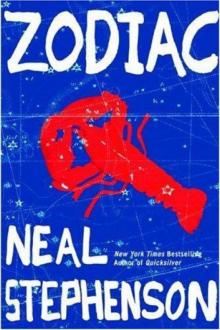 Zodiac: The Eco-Thriller
Zodiac: The Eco-Thriller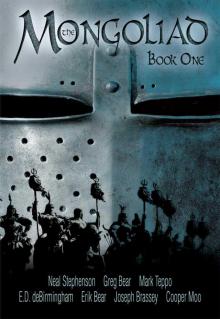 The Mongoliad: Book One
The Mongoliad: Book One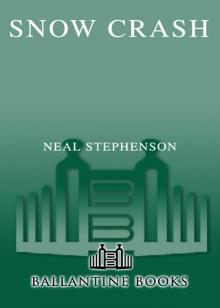 Snow Crash
Snow Crash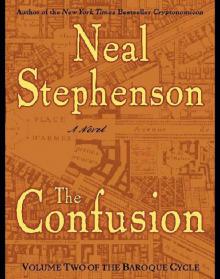 The Confusion: Volume Two of the Baroque Cycle
The Confusion: Volume Two of the Baroque Cycle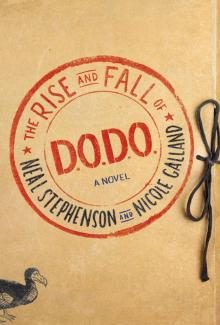 The Rise and Fall of D.O.D.O.
The Rise and Fall of D.O.D.O.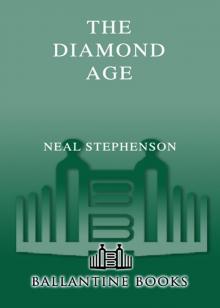 The Diamond Age: Or, a Young Lady's Illustrated Primer
The Diamond Age: Or, a Young Lady's Illustrated Primer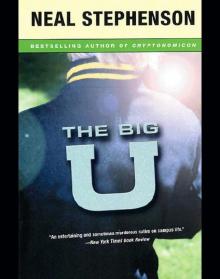 The Big U
The Big U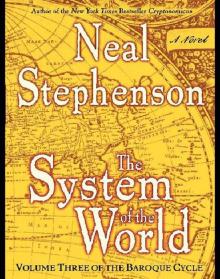 The System of the World: Volume Three of the Baroque Cycle
The System of the World: Volume Three of the Baroque Cycle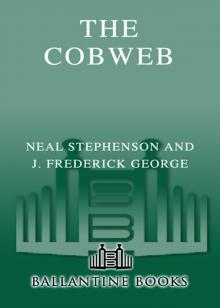 The Cobweb
The Cobweb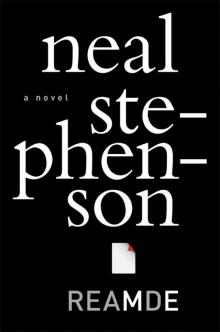 Reamde
Reamde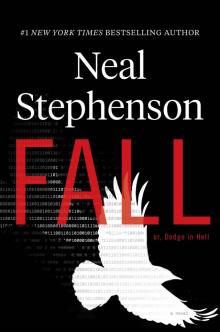 Fall; or, Dodge in Hell
Fall; or, Dodge in Hell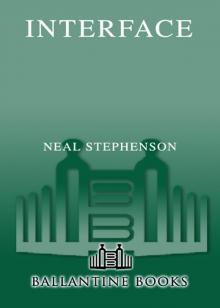 Interface
Interface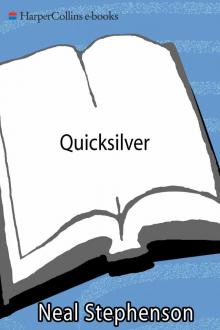 Quicksilver
Quicksilver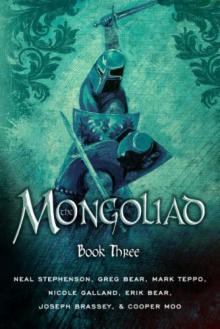 The Mongoliad: Book Three
The Mongoliad: Book Three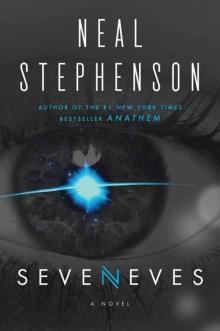 Seveneves
Seveneves Atmosphæra Incognita
Atmosphæra Incognita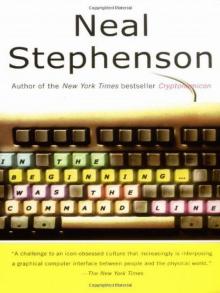 In the Beginning...Was the Command Line
In the Beginning...Was the Command Line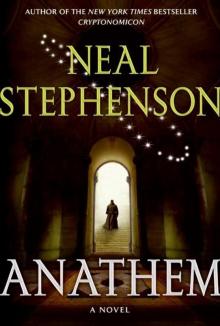 Anathem
Anathem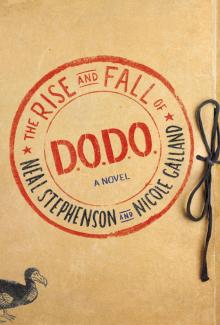 The Rise and Fall of D.O.D.O.: A Novel
The Rise and Fall of D.O.D.O.: A Novel The Mongoliad: Book Two
The Mongoliad: Book Two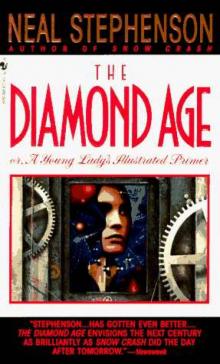 Diamond Age or a Young Lady's Illustrated Primer
Diamond Age or a Young Lady's Illustrated Primer THE System OF THE WORLD
THE System OF THE WORLD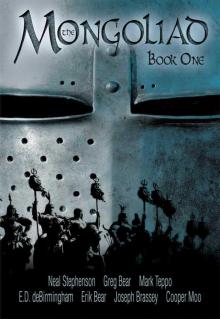 The Mongoliad: Book One tfs-1
The Mongoliad: Book One tfs-1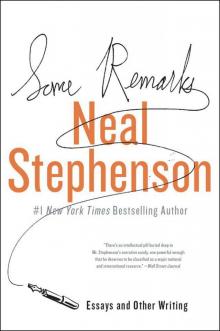 Some Remarks: Essays and Other Writing
Some Remarks: Essays and Other Writing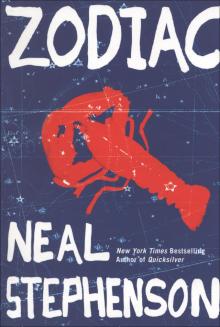 Zodiac
Zodiac Spew
Spew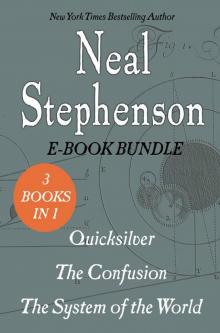 The Baroque Cycle: Quicksilver, the Confusion, and the System of the World
The Baroque Cycle: Quicksilver, the Confusion, and the System of the World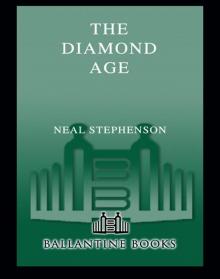 The Diamond Age
The Diamond Age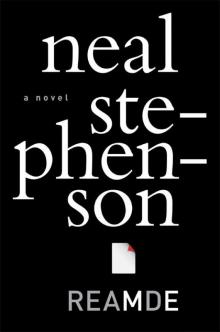 Reamde: A Novel
Reamde: A Novel In the Kingdom of Mao Bell
In the Kingdom of Mao Bell Mother Earth Mother Board
Mother Earth Mother Board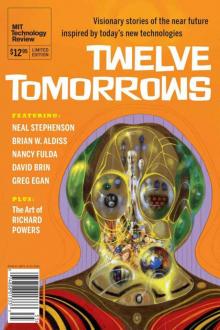 Twelve Tomorrows - Visionary stories of the near future inspired by today's technologies
Twelve Tomorrows - Visionary stories of the near future inspired by today's technologies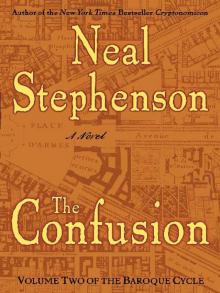 The Confusion
The Confusion The Great Simoleon Caper
The Great Simoleon Caper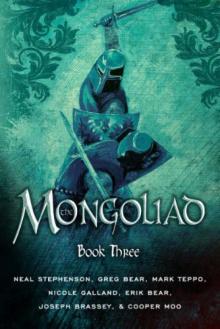 The Mongoliad: Book Three tfs-3
The Mongoliad: Book Three tfs-3